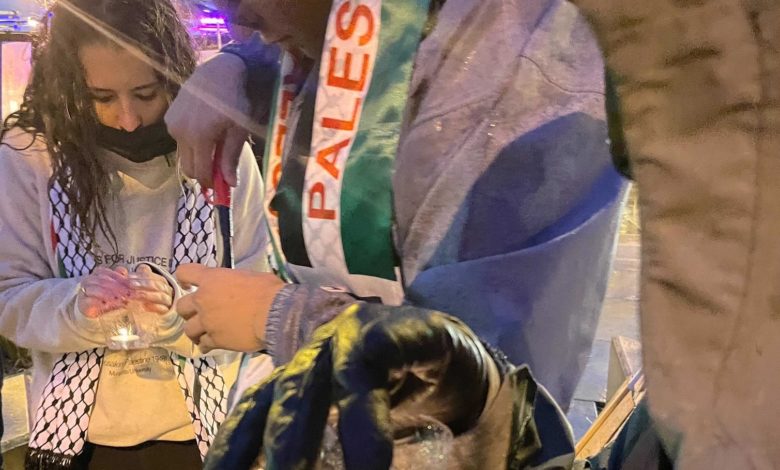
On Oct. 29, activists in Milwaukee, Wisconsin, congregated in the Bay View neighborhood for a candlelight vigil in support of seven Palestinian prisoners currently on hunger strike in Israeli jails. Although it was a windy, cold and rainy evening, the event attracted bystanders and passing cars expressing solidarity.
“One person walking by saw the Palestinian flag and the banners and joined us for the entire vigil,” organizer Ruba said. “Connections were made and parallels were highlighted between folks who are incarcerated here in Turtle Island and those who are taken as political prisoners in Palestine.”
The seven Palestinians are Kayed Fasfous, Meqdad Qawasmeh, Alaa Al-Araj, Hisham Abu, Shadi Abu Aker, Ayyad al Hrami and Rafaat Abu Rabee. Fasfous and Qawasmeh have both been on strike the longest — more than 100 days now. Fasfous was recently admitted to the hospital for deteriorating health, while Qawasmeh has been in intensive care and has lost his eyesight.
They are protesting being held on administrative detention orders. This Israeli policy allows detaining Palestinians indefinitely based on alleged secret information, without pressing formal charges or putting them on trial. It can last six months, but can be renewed indefinitely. There are more than 500 administrative detainees currently being illegally held by the Israeli authorities. These detainees have no charges against them and get no trials.
“Israel doesn’t abide by international law,” Ruba explained. “The settler-colonial state doesn’t respect human rights. They use administrative detention to scare Palestinians and try to quell their resistance. One of the prisoners is a poet who spoke out against the occupation; his ‘crime’ was writing revolutionary poetry. He was previously taken as a prisoner before and has spent many years in the occupation’s jails.”
U.S. role in oppressing Palestinians
Erica Steib of PSL Milwaukee explained, “The fight to free Palestine is the story of indigenous resilience.” Steib continued, “Israel couldn’t get away with this ethnic cleansing if it weren’t for the U.S. war machine propping it up. To free Palestine means to end the global capitalist imperialist system that funnels money into the technologies and prisons that kill and suppress Palestinians. That same boot on the neck of Palestinians is also on all the Black, Brown and Indigenous people imprisoned in the so-called United States.”
In 2019, Israel received $3.8 billion from the United States, and all but 0.2% of that was spent on their military, according to USAFacts.org. To date, Israel has received approximately $142.3 billion from the United States in bilateral assistance and missile defense funding. Meanwhile, President Trump ended all U.S. aid to Palestinians in the West Bank and Gaza in 2018; President Biden reversed Trump’s aid freeze earlier this year.
Milwaukee is slowly building a broad Palestine solidarity campaign to encompass both short- and long-term goals. “Right now we’re focusing on education and outreach,” Steib explained. “We are learning the many stories of Palestinian resistance, including the resistance of the BDS movement. One important lesson is that anything is possible with international solidarity and collective action.”
“There are so many organizations that do work around Palestine,” Ruba added. “Some organizations take on cultural and educational work, others take a political approach and work with elected officials. I personally think that we are due for a large meeting where all people doing this work can come together and share resources. Once we identify what we have available and share contacts and tactics, we can then determine what fits this city best.”
Feature photo: Activists in Milwaukee hold a candlelight vigil in support of Palestinian hunger strikers. Photo credit: Nate Thorngate-Rein




